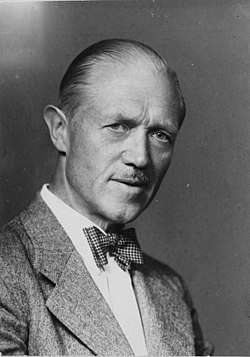Alex Brinchmann
Alexander Brinchmann (15 June 1888 – 18 April 1978) was a Norwegian children's physician and pediatrician. He was also a songwriter, novelist, playwright and crime fiction writer. He chaired of the Norwegian Pediatric Society 1933-1934 and the Norwegian Authors' Union 1941-1945.[1]

Personal life
Brinchmann was born in Kristiania (now Oslo), Norway. He was the son of rector Jacob Ludvig Hoffmann Brinchmann and Henny Leth. He was married in 1914 to Nina Grønvold (1891–1924), to Johanne Ringberg from 1925, and to Gunvor Næss (1897–1974) from 1944. He was the father of film producer and theatre director Arild Brinchmann.[2][3]
Medical career
Brinchmann finished his secondary education in 1906. He then studied medicine, graduating as cand.med. in 1912. From 1913 to 1914 he specialized in pediatrics at the Charité Hospital in Berlin. From 1918 until 1971, he worked at Rikshospitalet in Kristiania. He was authorized as a specialist in pediatrics in 1921, and became a dr.med. in 1922. Among his medical writings were articles on children's tuberculosis, and later mental hygiene for children. He was the chairman of the Norwegian Pediatric Society (Barnelegeforeningen) 1933-1934. He received the King's Medal of Merit (Kongens fortjenstmedalje) in gold during 1952.[4][5]
Literary career
Brinchmann made his literary debut in 1927 with the crime novel Mysteriet Steegener, published under the pseudonym "Roy Roberts". Among his other novels are Deilig er jorden from 1931 and Den rike mann from 1937.[2] His comedy Karusell was staged at Nationaltheatret in 1940, directed by Gerda Ring, with Aase Bye and Per Aabel playing the main characters.[6] Brinchmann chaired the Writers' Guild of Norway from 1938 to 1956. He published the book Norske forfattere i krig og fred. Den Norske forfatterforening 1940–1968 in 1968, in cooperation with Sigurd Evensmo.[2]
He chaired the Norwegian Authors' Union during World War II from 1941 to 1945 .[2] He was a member of the Norwegian Resistance Movement's cultural council from 1943.[2] He was arrested in January 1945 and held at Møllergata 19 and at the Grini concentration camp until 30 April 1945.[7]
References
- Beyer, Edvard; Moi, Morten. "Alex Brinchmann". Store norske leksikon (in Norwegian). Oslo: Kunnskapsforlaget. Retrieved 7 March 2010.
- Dahl, Willy. "Alex Brinchmann". In Helle, Knut (ed.). Norsk biografisk leksikon (in Norwegian). Oslo: Kunnskapsforlaget. Retrieved 7 March 2010.
- "Arild Brinchmann". lokalhistoriewiki.no. Retrieved March 1, 2018.
- "Alexander Brinchmann (1888–1978)". lokalhistoriewiki.no. Retrieved March 1, 2018.
- "Kongens fortjenstmedalje". lokalhistoriewiki.no. Retrieved March 1, 2018.
- Rønneberg, Anton (1949). Nationaltheatret gjennom femti år (in Norwegian). Oslo: Gyldendal. pp. 376–377.
- Giertsen, Børre R., ed. (1946). "17671. Brinchmann, Alex". Norsk fangeleksikon. Grinifangene (in Norwegian). Oslo: Cappelen. p. 618.